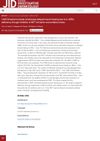 April 2023 in “Journal of Investigative Dermatology”
April 2023 in “Journal of Investigative Dermatology” Dimethyl fumarate speeds up wound healing in IL-36Ra deficient mice by reducing NET formation and oxidative stress.
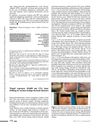 1 citations,
July 2015 in “European Journal of Dermatology”
1 citations,
July 2015 in “European Journal of Dermatology” CO₂ laser treatment is fast and effective for some benign skin tumors with minimal side effects.
 114 citations,
December 1951 in “Archives of Dermatology”
114 citations,
December 1951 in “Archives of Dermatology” Aminopterin strongly suppresses epithelial tissues and can treat certain skin conditions but has significant side effects.
 14 citations,
January 2008 in “Dermatology”
14 citations,
January 2008 in “Dermatology” Vitamin D made by the skin plays a role in immune defense and skin health, and more research is needed to understand its full effects.
 2 citations,
November 2015 in “Journal of Investigative Dermatology”
2 citations,
November 2015 in “Journal of Investigative Dermatology” RANKL improves the immune response against herpes simplex virus by enhancing T cell activation and could help develop better treatments or vaccines.
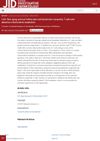 April 2023 in “Journal of Investigative Dermatology”
April 2023 in “Journal of Investigative Dermatology” Defective T cell metabolism can cause early skin aging and poor hair follicle stem cell function.
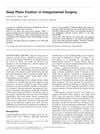 1 citations,
February 2004 in “Dermatologic Surgery”
1 citations,
February 2004 in “Dermatologic Surgery” Deep Plane Fixation in scalp surgeries allows for more tissue removal with less tension, leading to better healing and less scarring.
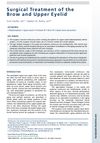 14 citations,
March 2015 in “Facial plastic surgery clinics of North America”
14 citations,
March 2015 in “Facial plastic surgery clinics of North America” Individualized assessment and meticulous planning are crucial for successful brow and upper eyelid surgery.
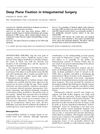 February 2004 in “Dermatologic Surgery”
February 2004 in “Dermatologic Surgery” Deep Plane Fixation in scalp surgeries allows for more tissue removal with less tension and minimal scarring.
 7 citations,
January 2018 in “Indian Journal of Pharmacology”
7 citations,
January 2018 in “Indian Journal of Pharmacology” Algerian Carthamus caeruleus L plant has anti-inflammatory properties, heals wounds effectively, and may help with hair growth.
 24 citations,
January 2008 in “KARGER eBooks”
24 citations,
January 2008 in “KARGER eBooks” The document concludes that ongoing research using animal models is crucial for better understanding and treating Alopecia Areata.
 18 citations,
November 2007 in “Annals of Surgery”
18 citations,
November 2007 in “Annals of Surgery” Finasteride reduces inflammation and improves immune response after trauma by altering hormone levels.
 12 citations,
January 2016 in “Skin appendage disorders”
12 citations,
January 2016 in “Skin appendage disorders” Hair restoration surgery can potentially treat primary scarring alopecias, but it's important to start early medication, ensure patient remission before transplant, and monitor after surgery.
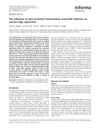 1 citations,
December 2012 in “Journal of Dermatological Treatment”
1 citations,
December 2012 in “Journal of Dermatological Treatment” Injecting triamcinolone acetonide near surgical cuts doesn't greatly affect wound healing but may help in areas with less tension.
 January 2012 in “Elsevier eBooks”
January 2012 in “Elsevier eBooks” Hair loss can cause emotional and social issues, and various treatments, including medication, surgery, and psychological support, are needed.
 24 citations,
August 2017 in “Prostaglandins & Other Lipid Mediators”
24 citations,
August 2017 in “Prostaglandins & Other Lipid Mediators” CRTH2 antagonists might be useful for treating many conditions because they play a role in immune and inflammation responses.
 11 citations,
May 2019 in “Journal of Cosmetic Dermatology”
11 citations,
May 2019 in “Journal of Cosmetic Dermatology” Mesotherapy helps treat male hair loss effectively.
 July 2003 in “Journal of Cutaneous Medicine and Surgery”
July 2003 in “Journal of Cutaneous Medicine and Surgery” Certain drugs can cause lupus, stopping these drugs is the main treatment. NB-UVB phototherapy clears psoriasis faster when applied three times a week. Monoclonal antibodies and oral pimecrolimus are effective in treating psoriasis. Smoking and drinking are linked to psoriasis in men. No direct link between low iron and hair loss was found. Vaccines are effective against genital herpes and human papillomavirus type 16.
October 2023 in “Applied sciences” Iris germanica rhizome-derived exosomes help protect skin cells from oxidative stress and aging.
 1 citations,
October 2022 in “Annual review of cell and developmental biology”
1 citations,
October 2022 in “Annual review of cell and developmental biology” The nervous system helps control stem cell behavior and immune responses, affecting tissue repair and maintenance.
 February 2024 in “Frontiers in physiology”
February 2024 in “Frontiers in physiology” Lymphatic vessels are important for skin repair and could affect skin disease treatments.
April 2024 in “Biomolecules” Exosomal miRNAs from stem cells can help improve skin health and delay aging.
March 2024 in “Cosmetics” New regenerative techniques show promise for improving skin, healing wounds, and growing hair.
 2 citations,
January 2022 in “Journal of Investigative Dermatology”
2 citations,
January 2022 in “Journal of Investigative Dermatology” Hedgehog signaling in skin cells is crucial for hair growth and skin healing, but needs to be balanced to avoid harmful effects like scarring and cancer.
 131 citations,
November 1998 in “The journal of investigative dermatology/Journal of investigative dermatology”
131 citations,
November 1998 in “The journal of investigative dermatology/Journal of investigative dermatology” Skin grafts on mice can cause an immune response leading to hair loss, useful for studying human hair loss conditions.
 305 citations,
February 2007 in “Hormone and metabolic research”
305 citations,
February 2007 in “Hormone and metabolic research” Human skin makes sexual hormones that affect hair growth, skin health, and healing; too much can cause acne and hair loss, while treatments can manage these conditions.
 September 2013 in “Regenerative Medicine”
September 2013 in “Regenerative Medicine” γδ T cells help with hair growth during wound healing in mice.
 May 2013 in “Springer eBooks”
May 2013 in “Springer eBooks” Skin problems in the elderly are unique and may indicate other diseases, involving changes in skin, hair, nails, and increased cancer risk.
 23 citations,
November 2018 in “npj Regenerative Medicine”
23 citations,
November 2018 in “npj Regenerative Medicine” Healing of heart and skin wounds in animals are similar.
1 citations,
January 2024 in “International journal of molecular sciences” TRPV4 helps cells repair tissue and reduce scarring by controlling calcium levels.

























